| Listing 1 - 10 of 20 | << page >> |
Sort by
|
Periodical
ISSN: 23278455 Year: 1994 Publisher: [Las Vegas, Nev.] : [UNLV International Gaming Institute] : [William F. Harrah College of Hotel Administration],
Abstract | Keywords | Export | Availability | Bookmark
 Loading...
Loading...Choose an application
- Reference Manager
- EndNote
- RefWorks (Direct export to RefWorks)
Gambling --- 83.67 industry --- Law and legislation --- Gambling. --- Law and legislation. --- Betting --- Chance, Games of --- Games of chance --- Gaming (Gambling) --- Games --- Casinos --- Wagers
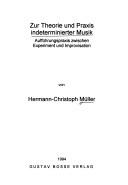
ISBN: 3764924772 Year: 1994 Publisher: Kassel Bosse
Abstract | Keywords | Export | Availability | Bookmark
 Loading...
Loading...Choose an application
- Reference Manager
- EndNote
- RefWorks (Direct export to RefWorks)
Aleatory music --- Music --- Aleatorism --- Chance composition --- Chance operations (Music) --- Indeterminacy (Music) --- Composition (Music) --- Improvisation (Music) --- History and criticism --- improvisatie --- muziektheorie --- uitvoeringspraktijk --- experimenten --- anno 1900-1999
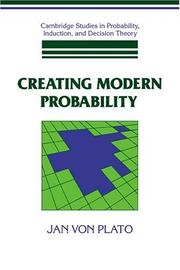
ISBN: 0521444039 0521597358 1316045595 0511609108 9780521444033 9780511609107 9780521597357 Year: 1994 Publisher: Cambridge Cambridge University Press
Abstract | Keywords | Export | Availability | Bookmark
 Loading...
Loading...Choose an application
- Reference Manager
- EndNote
- RefWorks (Direct export to RefWorks)
This is the only book to chart the history and development of modern probability theory. It shows how in the first thirty years of this century probability theory became a mathematical science. The author also traces the development of probabilistic concepts and theories in statistical and quantum physics. There are chapters dealing with chance phenomena, as well as the main mathematical theories of today, together with their foundational and philosophical problems. Among the theorists whose work is treated at some length are Kolmogorov, von Mises and de Finetti. The principal audience for the book comprises philosophers and historians of science, mathematicians concerned with probability and statistics, and physicists. The book will also interest anyone fascinated by twentieth-century scientific developments because the birth of modern probability is closely tied to the change from a determinist to an indeterminist world-view.
Probability theory --- anno 1800-1999 --- Probabilities --- History. --- -Probability --- Statistical inference --- Combinations --- Mathematics --- Chance --- Least squares --- Mathematical statistics --- Risk --- History --- -History --- Arts and Humanities --- Philosophy --- Probabilities - History.
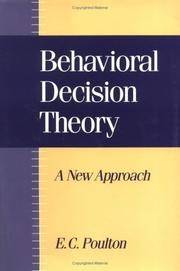
ISBN: 0521443687 0511574894 Year: 1994 Publisher: Cambridge : Cambridge University Press,
Abstract | Keywords | Export | Availability | Bookmark
 Loading...
Loading...Choose an application
- Reference Manager
- EndNote
- RefWorks (Direct export to RefWorks)
This book discusses the well known fallacies of behavioural decision theory. It shows that while an investigator is studying a well-known fallacy, he or she may introduce, without realizing it, one of the simple biases that are found in quantifying judgements. The work covers such fallacies as the apparent overconfidence that people show when they judge the probability of correctness of their answers to two-choice general knowledge questions using a one-sided rating scale; the apparent overconfidence in setting uncertainty bounds on unknown quantities when using the fractile method; the interactions between hindsight and memory; the belief that small samples are as reliable and as representative as large samples;; the regression fallacy in prediction; the availability and simulation fallacies; the anchoring and adjustment biases; and bias by frames. The aim of this book is to help readers to learn about the fallacies and thus to avoid them. As such, it will be useful reading for students and researchers in probability theory, statistics and psychology.
Fallacies (Logic) --- Probabilities. --- Fallacies (Logic). --- Mathematical Sciences --- Probability --- Errors, Logical --- Sophisms (Logic) --- Sophistry (Logic) --- Judgment (Logic) --- Logic --- Reasoning --- Statistical inference --- Combinations --- Mathematics --- Chance --- Least squares --- Mathematical statistics --- Risk
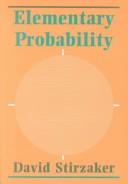
ISBN: 0521421837 9780521421836 Year: 1994 Publisher: Cambridge: Cambridge university press,
Abstract | Keywords | Export | Availability | Bookmark
 Loading...
Loading...Choose an application
- Reference Manager
- EndNote
- RefWorks (Direct export to RefWorks)
519.2 --- 519.2 Probability. Mathematical statistics --- Probability. Mathematical statistics --- Probabilities --- Probability --- Statistical inference --- Combinations --- Mathematics --- Chance --- Least squares --- Mathematical statistics --- Risk --- Stochastic processes
Book
ISBN: 0387941142 1461264316 1441985409 Year: 1994 Publisher: New York Springer
Abstract | Keywords | Export | Availability | Bookmark
 Loading...
Loading...Choose an application
- Reference Manager
- EndNote
- RefWorks (Direct export to RefWorks)
Stochastic processes --- Mathematical statistics --- Probabilities. --- Mathematical statistics. --- Probabilités --- Statistique mathématique --- Probabilities --- #SBIB:303H521 --- Mathematics --- Statistical inference --- Statistics, Mathematical --- Statistics --- Sampling (Statistics) --- Probability --- Combinations --- Chance --- Least squares --- Risk --- Methoden sociale wetenschappen: waarschijnlijkheid --- Statistical methods --- Probabilités --- Statistique mathématique
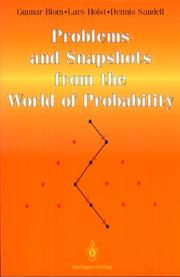
ISBN: 0387941614 3540941614 1461243041 Year: 1994 Publisher: New York Springer
Abstract | Keywords | Export | Availability | Bookmark
 Loading...
Loading...Choose an application
- Reference Manager
- EndNote
- RefWorks (Direct export to RefWorks)
Stochastic processes --- Probabilities --- Probabilités --- Problems, exercises, etc --- Problèmes et exercices --- 519.2 --- -Probability --- Statistical inference --- Combinations --- Mathematics --- Chance --- Least squares --- Mathematical statistics --- Risk --- Probability. Mathematical statistics --- -Probability. Mathematical statistics --- 519.2 Probability. Mathematical statistics --- -519.2 Probability. Mathematical statistics --- Probability --- Probabilités --- Problèmes et exercices --- Probabilités. --- Markov, Processus de --- Markov processes --- Probabilités.
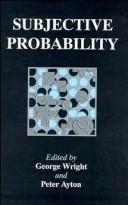
ISBN: 0471944432 Year: 1994 Publisher: New York, NY ; Chichester : John Wiley,
Abstract | Keywords | Export | Availability | Bookmark
 Loading...
Loading...Choose an application
- Reference Manager
- EndNote
- RefWorks (Direct export to RefWorks)
519.21 --- Social sciences --- -Probabilities --- Subjectivity --- Subjectivism --- Knowledge, Theory of --- Relativity --- Probability --- Statistical inference --- Combinations --- Mathematics --- Chance --- Least squares --- Mathematical statistics --- Risk --- Behavioral sciences --- Human sciences --- Sciences, Social --- Social science --- Social studies --- Civilization --- Probability theory. Stochastic processes --- Statistical methods --- 519.21 Probability theory. Stochastic processes --- Probabilities
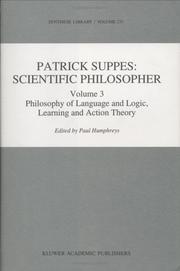
ISBN: 0792325524 9401043310 9401107742 Year: 1994 Publisher: Dordrecht Kluwer
Abstract | Keywords | Export | Availability | Bookmark
 Loading...
Loading...Choose an application
- Reference Manager
- EndNote
- RefWorks (Direct export to RefWorks)
Science --- -Probabilities --- Language and languages --- -Language and logic --- Linguistics and logic --- Logic in language --- Logic --- Semantics --- Foreign languages --- Languages --- Anthropology --- Communication --- Ethnology --- Information theory --- Meaning (Psychology) --- Philology --- Linguistics --- Probability --- Statistical inference --- Combinations --- Mathematics --- Chance --- Least squares --- Mathematical statistics --- Risk --- Natural science --- Science of science --- Sciences --- Philosophy --- Suppes, Patrick --- Language and logic. --- Probabilities. --- Philosophy. --- -Language and logic. --- Natural sciences
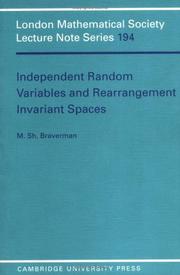
ISBN: 1139884972 1107366925 1107371570 1107362016 1107368804 1299404642 1107364469 0511662343 9781107362017 9780511662348 0521455154 9780521455152 Year: 1994 Publisher: Cambridge Cambridge University Press
Abstract | Keywords | Export | Availability | Bookmark
 Loading...
Loading...Choose an application
- Reference Manager
- EndNote
- RefWorks (Direct export to RefWorks)
The subject of this book lies on the boundary between probability theory and the theory of function spaces. Here Professor Braverman investigates independent random variables in rearrangement invariant (r.i.) spaces. The significant feature of r.i. spaces is that the norm of an element depends on its distribution only, and this property allows the results and methods associated with r.i. spaces to be applied to problems in probability theory. On the other hand, probabilistic methods can also prove useful in the study of r.i. spaces. In this book new techniques are used and a number of interesting results are given. Most of the results are due to the author but have never before been available in English. Here they are all presented together in a volume that will be essential reading for all serious researchers in this area.
Random variables. --- Rearrangement invariant spaces. --- Inequalities (Mathematics) --- Processes, Infinite --- Invariant spaces, Rearrangement --- Spaces, Rearrangement invariant --- Function spaces --- Chance variables --- Stochastic variables --- Probabilities --- Variables (Mathematics) --- Probability --- Random variables --- Rearrangement invariant spaces --- Variables aléatoires --- Sous espaces invariants --- 519.214 --- 519.214 Limit theorems --- Limit theorems
| Listing 1 - 10 of 20 | << page >> |
Sort by
|

 Search
Search Feedback
Feedback About UniCat
About UniCat  Help
Help News
News